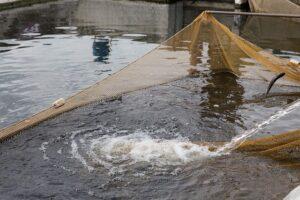Guest workers may also be needed in fish production due to the lack of domestic labor
Despite the challenges that have been observed in the fishing industry for years, 2024 holds promising opportunities. Favorable feed prices and ideal water levels paint a hopeful outlook for the future of the industry, but previous difficulties remain. In addition to low support and lagging developments, the biggest challenge is the labor shortage and declining consumption.

(Photo: Pixabay)
According to Ferenc Lévai, the spokesperson of the Hungarian Aquaculture and Fisheries Interprofessional Organization (MA-HAL), this year’s fish production is based on a stable foundation. Feed prices are at a favorable level, and adequate water levels are registered in the lakes. This clearly creates favorable conditions for production, especially taking into account the optimal amount of water even with the arrival of a hot summer, reports the Agrárszektor.
However, labor shortages continue to pose serious problems in the industry
The number of manual workers is constantly decreasing throughout agriculture, including fish production. The spokesperson revealed that it is difficult for lake farms with hundreds of hectares to ensure the minimum number of employees, and the use of guest workers has already been suggested as a solution. Although this has not been typical of the fishing sector so far, the recruitment of foreign workers can apparently be a solution to the shortage of professionals. Based on the experience of other agricultural sectors, it is clear that workers from India and the Philippines can cope effectively, and therefore it is expected that the employment of guest workers can also spread in fish production.
Another main challenge for the sector is the decline in demand
Although last year brought more favorable feed prices, and as a result extra production was experienced, demand still decreased. The decrease in consumption showed itself as a general trend, which also left its mark in the fishing sector, especially during the Christmas period. This decrease in consumption, which occurred in part due to lower real wages, also affects the market situation of the sector. Exports are also stagnant, as fish production has also increased in other countries, and the Czech competition is still present on the market with favorable prices.
Stagnating prices and rising costs are also reducing the sector’s profits
While feed prices remain low, other costs are experiencing significant increases, particularly in transportation costs. Due to the specifics of live fish transportation, which requires a large amount of water, transportation is expensive and the efficiency is low.
The demand for improvements in the fishing industry is growing
Although progress has been made in this area in recent years, further investments are still needed to increase efficiency. The lack of generational change is also a significant problem in the sector, and attracting and retaining young people is also crucial for the future.
Agrárszektor
Related news
Agricultural vocational training also places great emphasis on irrigation development
🎧 Hallgasd a cikket: Lejátszás Szünet Folytatás Leállítás Nyelv: Auto…
Read more >Related news
Nestlé to sell remaining ice-cream assets but commits to Froneri venture
🎧 Hallgasd a cikket: Lejátszás Szünet Folytatás Leállítás Nyelv: Auto…
Read more >40 secure jobs, sustainable solutions – new BURGER KING® in Csepel
🎧 Hallgasd a cikket: Lejátszás Szünet Folytatás Leállítás Nyelv: Auto…
Read more >









